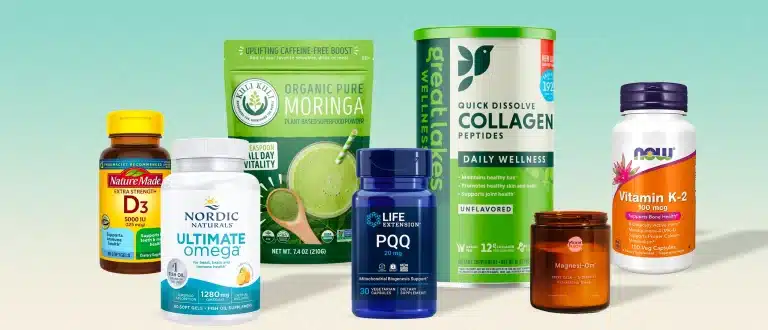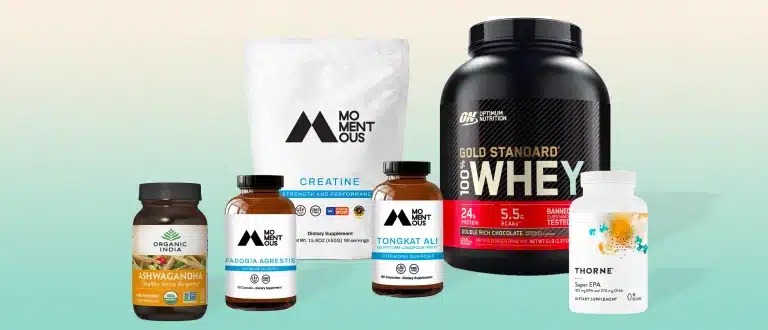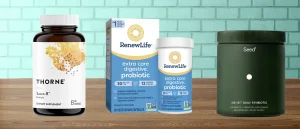9 Signs and Symptoms of Omega-3 Deficiency
Neuroscientist Andrew Huberman and cell biologist Dr. Rhonda Patrick both share a daily practice: they take an omega-3 supplement to help enhance their brain health—and you may want to follow their lead.
A study, found in a 2o22 issue of Current Developments in Nutrition, suggests many adults living in the U.S. are deficient in two of the three major omega-3 fatty acids, EPA and DHA (1).
Beyond enhancing cognitive abilities, these polyunsaturated fats can also protect your heart and ward off infection. Studies have shown they may help improve everything from joint pain to depression (2, 3).
Omega-3 fatty acids become increasingly important as you hit middle age. “Around the age of 35, your hormones start to decline, and functional aging begins. Levels of cortisol—the stress hormone—climb, and with them a higher risk of disease. A healthy lifestyle, which includes getting sufficient omega-3s, helps to counter the adverse health effects of stress,” says Robert Iafelice, M.S., R.D.N.
To make sure you’re getting enough, ask your doctor to test your levels, suggests Dr. Monisha Bhanote, M.D. FCAP, ABOIM.
What Are Omega-3s?
Omega-3 fatty acids are essential polyunsaturated fats (4). There are three main types:
- Alpha-linolenic acid (ALA)
- Eicosapentaenoic acid (EPA)
- Docosahexaenoic acid (DHA)
ALA is found in plant-based foods, like walnuts; and chia, flax, and hemp seeds. Meanwhile, EPA and DHA are predominantly present in oily fish, like salmon and sardines. While all three types play a role in the body, DHA and EPA are most important, says Iafelice.
If you don’t eat seafood, algae oil might be an effective plant-based EPA and DHA alternative. One study suggests algae oil may be just as effective at raising blood DHA levels as eating fish or supplementing with fish oils (5). Algae oil is also free of ocean contaminants (like mercury) that may be present in fish-based sources of omega-3s (6).
About the Experts
Robert Iafelice, M.S., R.D.N., is a registered dietitian and nutritionist and author of “Hold On To Your Muscle, Be Free of Disease.”
Dr. Monisha Bhanote, M.D. FCAP, ABOIM, is a quintuple board-certified physician. She runs a telehealth practice in integrative medicine, combining ancient wisdom with mind-body science to help her patients achieve optimal health.
Beata Rydyger, BS.c., R.H.N., is a registered holistic nutritionist (Canadian certification) who specializes in a wide range of nutritional needs. She works with those who have diabetes, gluten intolerance, and irritable bowel syndrome.
Benefits of Omega-3s
While EPA is known for its anti-inflammatory properties, DHA is more crucial for brain and eye health, says Bhanote (7). Here are the many ways these nutrients can contribute to your health and well-being.
Fight inflammation
Chronic inflammation is associated with many age-related chronic diseases, such as cancer, osteoarthritis, heart disease, diabetes, and Alzheimer’s disease,” says Beata Rydyger, B.S.c., R.H.N. “Omega-3s, particularly EPA and DHA, are powerful anti-inflammatory molecules that help to reduce chronic inflammation.”
Improve heart health
“Omega-3s are guardians for your heart, keeping your blood flowing smoothly and lowering the amount of bad fats in your blood,” says Bhanote. Because these nutrients can reduce harmful triglyceride levels, they may help to minimize your chances of a heart attack or stroke, says Iafelice (8).
Boost brain health
“So many people deal with mental decline and memory issues,” says Bhanote. “Omega-3’s help protect the brain as we get older.” Not only can they help give your memory a boost, but they can also reduce the risk of Alzheimer’s, she adds (9, 10).
Ease into sleep
DHA can be beneficial for sleep quality and length, says Bhanote. This influence is observed across age groups (11). “So, if you’re having trouble sleeping, consider looking at your omega-3 levels and, specifically, the DHA component.” DHA may play a role in melatonin production, which helps to promote sleep (12).
Promote skin health
Omega-3’s act like a natural moisturizer because they improve the health of the cell membranes, explains Bhanote. More structured cell membranes can mean fewer wrinkles, she adds (13).
Sharpen vision
“Omega-3’s are a major component of the retina,” says Bhanote, “which is why they’re important for eye health.” By getting enough of these fatty acids, you can help prevent macular degeneration as you age, she explains (14).
6 Omega-3 Deficiency Symptoms
Keep in mind that if you’re deficient in omega-3’s, you’re likely also low in other essential nutrients, Bhanote says. Here are some tell-tale signs.
Dry, itchy skin
“Omega-3s help keep everything in the body properly lubricated,” says Rydyger, adding that insufficient levels may cause skin dryness. In fact, omega-3 has been shown to provide benefits for mild dermatitis (eczema), dry skin conditions, and acne, as well as protect against sun damage (15).
“Omega-3s are essential for maintaining the skin’s dermis layer and keeping skin inflammation in check,” says Iafelice. “So, without them, skin issues may develop.”
Dull hair
“Skin and hair health go hand in hand,” reveals Bhanote, pointing out that low levels of omega-3’s can contribute to hair loss and dullness (16).
Joint pain
Omega-3s produce an anti-inflammatory response in the body. So, some experts believe joint stiffness related to inflammatory conditions like rheumatoid arthritis or lupus can be a sign of an omega-3 deficiency. “If your knees, shoulders, or other joints are unexpectedly achy, getting enough omega-3s may help increase lubrication and reduce inflammation,” says Rydyger (17).
Fatigue and sleep quality
Low circulating levels of EPA and DHA have been linked to severe fatigue. A diet that includes omega-3 fatty acid-rich foods has been shown to reduce chronic disease-related fatigue (18). A study published in a 2021 issue of Nutrients found that better sleep quality and duration were associated with higher levels of omega-3 fatty acids in healthy adults, especially DHA (19).
Brain fog
“Omega-3s are highly tied to cognitive functioning, so poor memory may be a symptom of a deficiency,” says Iafelice. According to a systematic review in Nutrients, taking a supplement might help reduce issues with memory and support overall brain health as you age, though more research is needed to determine the best dosage, timing, and length of interventions (20).
Cardiovascular problems
EPA and DHA can lower triglyceride levels (an independent risk factor for cardiovascular disease). So, eating foods rich in omega-3s could reduce the risk of certain heart diseases, notes the National Institutes of Health (4).
How Do I Get Enough Omega-3s?
Start with your diet. The NIH recommends eating fatty fish, such as salmon, tuna, sardines, mackerel, and herring (4)—aim for two servings a week, according to The American Heart Association (21). Also include plant-based sources, such as flaxseeds, walnuts, and chia seeds, which contain ALA. Vegetarians and vegans [or anyone who prefers plant-based products] can also supplement with algae EPA/DHA products, says Iafelice.
What to Look for in Omega-3 Supplements
When seeking out an omega-3 supplement, look for the following characteristics, suggest Iafelice and Rydyger:
- IFOS (International Fish Oils Standards) certification
- Wild-caught fish
- Antioxidants (such as vitamin E) to protect the oil from rancidity
- A total of both EPA + DHA of 1,000 to 1,200 mg per serving
Third-party testing for purity and contaminants such as mercury, lead, and PCBs - A freshness guarantee, such as a “best by” or “expiration” date, to ensure that the omega-3s are still effective
- A reputable brand with positive reviews from both customers and practitioners.
And, while the standard daily dose of omega-3’s is around 1,000 milligrams, Bhanote takes about three times that amount. However, if you’re considering adding omega-3s to your diet—especially in the form of a supplement—be sure to check with your doctor first. This is especially the case if you’re taking medications for other health conditions that could interact with the supplement.
At her practice, Bhanote tailors the ratio of each type of omega-3 supplement to her patient’s specific health conditions. For instance, she might recommend a supplement with a higher percentage of EPA for someone with osteoarthritis, and a larger dose overall for someone with more severe health issues (like someone who has had multiple heart attacks).
The Bottom Line
“Omega-3s are incredibly important for overall health, but it’s always best to get nutrients from a balanced diet first,” Rydyger notes. “If you are considering a supplement, talk to a practitioner to ensure it is appropriate for you and won’t interact with any medications you may be taking,” she adds.
References
1. Froyen, E. et, al. (2022). The Consumption of Omega-3 Fatty Acids in American Adults.
2. Kotstoglou-Anthanassiou, E. et al. (2020). The Effect of Omega-3 Fatty Acids on Rheumatoid Arthritis.
3. Medhi, S. et al. (2023). Omega-3 Fatty Acids Supplementation in the Treatment of Depression: An Observational Study.
4. National Institutes of Health (NIH) (2022). Omega-3 Fatty Acids.
5. Ryan, L. et al. (2015). Algal-Oil Supplements Are a Viable Alternative to Fish-Oil Supplements in Terms of Docosahexanoic Acid.
6. Harwood, J. et al. (2019). Algae: Critical Source of Very Long-Chain Polyunsaturated Fatty Acids.
7. James J. DiNicolantonio, James H. O’Keefe, et, al. (2020). The Importance of Marine Omega-3s for Brain Development and the Prevention and Treatment of Behavior, Mood, and Other Brain Disorders.
8. Bornfeldt, K. et al. (2021). Triglyceride Lowering by Omega-3 Fatty Acids: A Mechanism Mediated by N-Acyl Taurines.
9. Dighiri, I. et al. (2022). Effects of Omega-3 Polyunsaturated Fatty Acids on Brain Functions: A Systematic Review.
10. Wei, B. et al. (2023). The Relationship of Omega-3 Fatty Acids with Dementia and Cognitive Decline: Evidence from Prospective Cohort Studies of Supplementation, Dietary Intake, and Blood Markers.
11. Yokoi-Shimizu, K. et al. (2022). Effect of Docosahexaenoic Acid and Eicosapentaenoic Acid Supplementation on Sleep Quality in Healthy Subjects: A Randomized, Double-Blinded, Placebo-Controlled Trial.
12. Murphy, R. et al. (2022). Association of omega-3 levels and sleep in US adults, National Health and Nutrition Examination Survey, 2011-2012.
13. Huang, T. et al. (2018). Cosmetic and Therapeutic Applications of Fish Oil’s Fatty Acids on the Skin.
14. Lawrenson, J. et al. (2015). Omega 3 fatty acids for preventing or slowing the progression of age‐related macular degeneration.
15. Thomsen, B. et al. (2020). The Potential Uses of Omega-3 Fatty Acids in Dermatology: A Review.
16. Guo, E. et al. (2017). Diet and Hair Loss: Effects of Nutrient Deficiency and Supplement Use.
17. Arthritis Foundation. (2022). Omega-3 Fatty Acids for Your Health.
18. Haß, U. et al. (2019). Anti-Inflammatory Diets and Fatigue.
19. Michael J. Patan, et al. (2021). Differential Effects of DHA- and EPA-Rich Oils on Sleep in Healthy Young Adults: A Randomized Controlled Trial.
20. Derbyshire, E. et al. (2018). Brain Health across the Lifespan: A Systematic Review on the Role of Omega-3 Fatty Acid Supplements.
21. American Heart Association. (2021). Fish and Omega-3 Fatty Acids.














